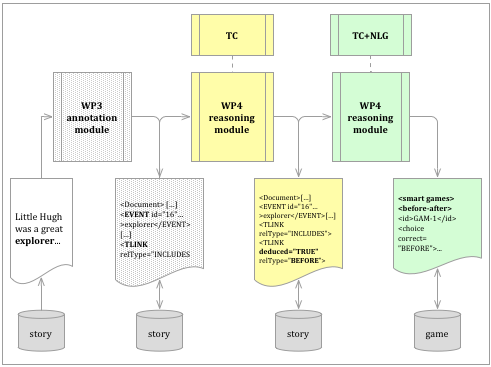Overview
What follows is documented in the D4.2 and D4.3 technical annex, and quickly recapped in the WP4 review slides.
TERENCE is an FP7 European project that develops the first adaptive learning system for reasoning about stories via smart games. The main end users of the system are primary-school poor comprehenders and their educators. The learning material of TERENCE is mainly made of stories, organised into books, and smart games for reasoning about stories.
The work of TERENCE is split into work packages (WPs). In particular, WP4 has the ultimate goal of automatically generating textual instances of smart games, designed in D2.3, from stories annotated by WP3.
Overview of the Automated Generation

The right figure represents the generation process of textual components of smart games, showing the central role of WP4 in them: starting with the annotated WP3 stories, WP4 then takes care of
- the enrichment of the annotated stories as in Task 4.2 via temporal constraint (TC) based algorithms and tools (TC),
- the generation of textual components of smart games as in Task 4.3 via TC and natural language generation (NLG) algorithm and tools.
Below, the reader can find information and pointers to the enrichment service, the generation service and the resulting textual repository of WP4, hosted in this web site.
Enrichment of Annotations
As for stories, the reasoning module provides on-line services for enriching the annotated stories of WP3. In this manner, the module complements the annotation process over stories performed in WP3 and returns enriched annotated stories ready for the generation process.
Generation and Repository of Textual Smart Games
In the generation process, the reasoner takes the stories enriched by the enrichment services and generates a repository of textual smart games in XML format.
References
Technical details concerning the reasoning module, and WP4 in general, are in the D4.2 and D4.3 technical annex. Background information is in D4.1.
A shorter recap of WP4 work in 3 years of the TERENCE project, focussing on the last year, is in the WP4 review slides.
Acknowledgments
The overall generation process required and still requires a tight collaboration work between LUB and UnivAQ, as well as FBK-irst, KUL, LUH and USAL for developing and integrating the modules in the system developed in WP6, and AMNIN for testing.
The TERENCE project, n. 257410, is funded by the European Commission through the Seventh Framework Programme for Research and Technological Development, Strategic Objective ICT-2009.4.2: ICT: Technology-enhanced learning. The contents of the these documents reflects only the authors' view and the European Commission is not liable for it.
Stories, games, images, software components, logos
and anything else published and reproduced in this site is of
the TERENCE consortium, unless differently specified. It is
forbidden to use them for commercial purposes. You can alter,
transform, or build upon this work if and only if you
received an explicit written permission by the TERENCE
consortium to be reached via
